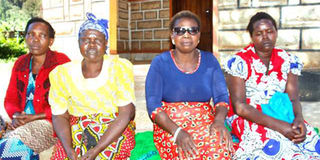Laws' review crucial to protect widows from injustices

Come-together Widows and Orphans Organisation chairperson Violet Kobia (second right) with other members during the interview. A majority of the organisation’s 3,000 members are battling land-related problems. PHOTO | DAVID MUCHUI | NATION MEDIA GROUP
What you need to know:
- The government has embarked on a project to review existing policies and legal frameworks to address challenges faced by widows
- Widows experience dis-inheritance, discrimination and other harmful traditional practices such as sexual violence and being subjected to cleansing rites
- In Kenya, there are approximately one million widows at risk of being disinherited and facing harmful traditional practices
The government has embarked on a project to review existing policies and legal frameworks to address challenges faced by widows.
The Ministry of Public Service and Gender, in partnership with Come Together Widows and other relevant stakeholders launched the project during a virtual fundraising gala organised by Global Fund for Widows.
Gender Cabinet Secretary Prof Margaret Kobia said widows experience dis-inheritance, discrimination and other harmful traditional practices such as sexual violence and being subjected to cleansing rites.
Subjected to poverty
She said widows face injustices and many are subjected to poverty after being disinherited by relatives.
“We are trying to influence policy and legal framework to enable widows get justice and fairness whenever their properties are taken away. For instance, the government is already supporting widows through the Women Enterprise Fund through the provision of interest-free loans to empower them economically,” said Prof Kobia.
She added that the government will carry out a sensitisation campaign to educate communities on the importance of protecting women who are widowed from injustices.
The CS commended the Global Fund for empowering widows through economic empowerment to improve their lives.
In Kenya, there are approximately one million widows at risk of being disinherited and facing harmful traditional practices.
Social stigma, shame and taboo
In many communities, widows are often prevented from inheriting assets including those she acquired or contributed to its acquisition during the marriage.
They are also discriminated against by being prevented from accessing their rights, prevented from getting government entitlements, denied access to justice, subjected to social stigma, shame and taboo.
Every year, widows in the country participate in celebrations to observe International Widows Day where they interrogate gains made in social-economic empowerment, legal framework as well as to chart a way forward on where they want done and achieved.
International Widows Day is a United Nations ratified day of action to address the "poverty and injustice faced by millions of widows and their dependents in many countries.
Succession Act
Grassroots Organisations Operating Together in Sisterhood (GROOTS) Kenya Executive Director Frida Githuku said on widows and land rights, it is sad to note that thousands of widows countrywide continue to lose land and property that belongs to them by virtue of belonging to their late husbands.
She said the Succession Act is sufficient to protect widows but adds that the problem is with its implementation.
“Women tend to fear the courts and it is time that the Judiciary becomes friendlier to them. The process of succession is also expensive and rigorous which locks out many widows more so those in rural areas as they cannot afford. The cost of succession needs to be brought down tremendously,” she said.
Her organisation has since assisted at least 4,000 widows countrywide to get back land which had been disinherited or was at the brink of being disinherited.
To guard against victimisation of widows, the organisation has assisted women to form watchdog groups in hotspot counties where disinheritance is rampant.




